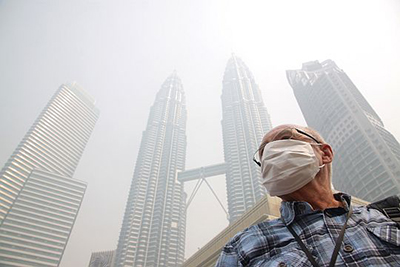 For the past few weeks, my wards have been hit hard by influx of haze related illnesses. Young and old asthmatics are coughing and wheezing their way in. My chronic lung patients having worst exacerbations with some ended up badly needing ventilation support. Many fragile geriatrics have also fallen hard under the weather with many admitted due to community acquired pneumonias.
For the past few weeks, my wards have been hit hard by influx of haze related illnesses. Young and old asthmatics are coughing and wheezing their way in. My chronic lung patients having worst exacerbations with some ended up badly needing ventilation support. Many fragile geriatrics have also fallen hard under the weather with many admitted due to community acquired pneumonias.
In fact – it wasn’t just the sickly who have fallen victims to the haze. Even doctors and nurses – myself not excluded – have had ourselves or a close family member calling in sick citing haze related illnesses. Many complained of eyes, nose and throat irritation – coughing and sneezing all day.
In other words – hazy season = sick season.
BUT – there is no need to panic. For most healthy individuals, short-term exposure (i.e. over a few days) to haze will generally do not cause any major health problems. Follow these simple tips to stay healthy during this hazy season.
- STAY INDOORS
Reduce all of your outdoor physical activity when the air quality is unhealthy. Elderly, children, individuals with preexisting chronic heart and lung conditions should avoid exposing themselves to the unhealthy hazy air outside. This is especially when the Air Pollution Index is in the unhealthy range (PSI level 101-200) and beyond. Keep windows shut and do not let haze particles enter the house. Only open the windows and doors for air ventilation when the air quality outside are within ‘safe’ range (less than PSI 100). - MINIMIZE OUTDOOR ACTIVITIES
Vulnerable people such as the elderly, pregnant women and children should minimize prolonged and strenuous outdoor activity. Pregnant women in 2nd and 3rd trimester should only use the N95 masks for short periods of time. - LIMITING EXPOSURE WHILE DRIVING
Keep your vehicle windows closed while driving. Use air-conditioner and use the car setting to recirculate air within the car rather than allowing air from outside into your vehicle. For cyclists and motorcyclists, use mask and eye goggles to protect your eyes and airway while you are outside. - USE MASKS
Masks such as the N95 masks are designed to filter out fine particulate matter that is found in the hazy air. Make sure the mask is fitted well when in use. Surgical masks and 3-ply masks are less efficient in filtering fine particles. N95 masks are not certified for use in children hence the reason why children should stay indoors as much as possible. - KEEP YOURSELF HYDRATED
Drink more water than usual to stay well hydrated. - SEEK HELP IF NEEDED
Visit your doctor for assessment if you feel unwell or develop health problems especially breathing problems. Individuals with existing chronic heart and lung conditions should ensure that they carry their medications especially reliever inhaler device everywhere they go. - STOP SMOKING IF YOU ARE A SMOKER
If you do not smoke, avoid smokers as well. The hazy air surrounding us are already unhealthy to begin with – we do not need to inhale additional haze particle produced by smokers.
[This article belongs to The Malaysian Medical Gazette. Any republication (online or offline) without written permission from The Malaysian Medical Gazette is prohibited.]
